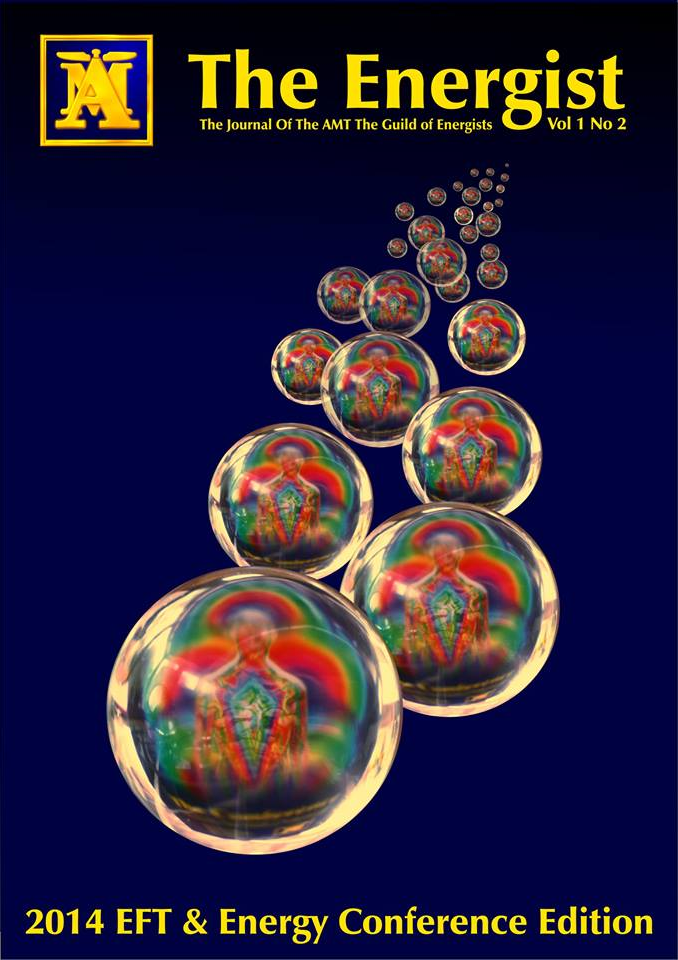The Healing Hands of Matrix Reimprinting
In this article, Dr. Elizabeth Boath and Professor Tony Stewart talk about Matrix Reimprinting using EFT, and how it can help people with Post-Traumatic Stress Disorder as well as a whole range of other issues. Read on for the full article...
Added Nov 8, 2014
|
| 8,864 Reads
Matrix reimprinting (MR) is a new and evolving energy psychology intervention. Matrix Reimprinting incorporates recent understanding from quantum and epigenetic science alongside Emotional Freedom Techniques (EFT) and inner child work, referred to as ECHOs (Energy Consciousness Holograms) Using MR, the client works with the ECHO to release the issue or trauma. A new and positive picture is then created and highlighted, which is used to reprogram the mind with the new information, indicating that the trauma is over (Dawson & Allenby, 2010). A plethora of anecdotal evidence suggests that Matrix Reimprinting may be effective for a range of issues including post-traumatic stress disorder, allergies, phobias, pain management, depression and anxiety, grief and much more (Dawson & Marillat, 2014; Stewart et al., 2013). Matrix Reimprinting research is a new and evolving field that is being led by Associate Professor, Dr Elizabeth Boath and Professor Tony Stewart at Staffordshire University in the UK, who published the first ever evaluation of a Matrix Reimprinting in an NHS setting (Stewart et al., 2013). A second pilot study focussed on the work of Caroline Rolling and Fiona Smith, two highly experienced Matrix Reimprinting practitioners with particular expertise in Post-Traumatic Stress Disorder who volunteered to work with the Healing Hands Network, is a Charitable Organisation that aims to help survivors of the war in Bosnia-Herzegovina, by providing ‘hands on’ therapy to people living with mental, physical and emotional effects of the 1992-95 war. Eighteen civilian survivors, who had been exposed to a wide range of traumatic events during the war agreed to take part in the study. None of them spoke English and so interpreters who had received and introduction to EFT and MR were used. The clients were offered a maximum of four one-hour sessions of MR each. The clients were asked to complete a PTSD scale called the PTSD Checklist – Civilian (PCL-C) before receiving MR, after two weeks MR and then at 4 weeks follow-up. They were also asked to complete an evaluation form at the end, which included the opportunity to provide qualitative information about their experience. There was a significant reduction in the average scores in the PCL-C from pre to post MR and this reduction in score was maintained at the 4 week follow-up. The evaluation form completed by participants revealed a richer insight into their experience of MR and four key themes emerged:
MR produced both positive psychological and physical changes: “ I have noticed a change, and a positive one. I feel very happy, satisfied, more brave and more positive overall towards life. I became happier and more communicative with my friends...My family has noticed this change in me as well my friends who now say I appear to be more cheerful and more talkative” ‘At the beginning I felt a huge burden on my shoulders, and my mind was filled with grey thoughts but after only one session my mind cleared, the greyness disappeared and I felt stronger.” Participants reported that not only had MR had given them the strength to move on with their life, but that learning EFT as part of MR had provided them with a strategy for self-care: “The sessions gave me enough strength to move on with my life...While I was coming to the therapies, my family has noticed that I was a lot calmer. When I feel stressed, I try to sit down and tap and that makes me feel better and relaxed. This therapy has had a positive effect on me most definitely” Rapport is critical in building a therapeutic alliance with a client and the participants noted the positivity and empathy of the therapists: “We have worked with beautiful therapists who knew how to help us. Both of the therapists showed us a lot of understanding and they had so much positive energy that they managed to transform onto us as well. I would like to ask this organisation to send these lovely people to Bosnia again. I am very grateful to both of them”. A large number of participants stated that they would like further MR Sessions and that they would recommend this treatment to others: “These therapies gave me strength, self-confidence and peace. I feel excellent...I would love to be able to get this kind of treatment again and I would recommend this treatment to anyone” “Treatment is very good and it has been very helpful to me and to my colleagues. In the future, I would like to continue the treatment since it has helped me and would definitely recommend it to others.” Despite the small number of participants in this study, matrix reimprinting resulted in significant improvements in scores on the PTSD scale. The quotes from participants also suggest that MR is an effective and acceptable intervention for post-traumatic stress disorder. However further controlled research studies are required.
~ This article was first published in the Autumn 2014 (Vol.1 No.2) edition of The Energist. The Energist is The GoE's new quarterly journal-style magazine that is distributed to over 1,000 of our members and associates worldwide. Find out more about The Energist and how to get your copy by clicking here. More information: - EFT Master Practitoner Course Information - EFT Master Practitioner Live Trainings
For further information on Matrix Reimprinting research and the latest book please see: Boath, E., T. Stewart and C. Rolling, 2014. The impact of EFT and matrix reimprinting on the civilian survivors of war in Bosnia: A pilot study. Curr. Res. Psychol., 5: 65-73. Dawson K, Allenby S (2010). Matrix Reimprinting using EFT. London: Hay House. Dawson, K & Marillat, K (2014) Transform Your Beliefs, Transform Your Life EFT Tapping Using Matrix Reimprinting. Hay House. Stewart, A., Boath, E. & Carryer, A, Walton, I, Hill, L & Dawson, K (2013) Can Matrix Reimprinting Be Effective in the Treatment of Emotional Conditions in a Public Health Setting? Results of a U.K. Pilot Study. Energy Psychology Journal, DOI: 0.9769.EPJ.2013.5.1.AS.EB.AC.IW.LH.DP.KD.
Added Nov 8, 2014
|
| 8,864 Reads
🗣 Chat!
Dr Liz Boath
Dr Liz Boath has kindly contributed the following titles to the 🏫 GoE Library:

The Energist - Vol 2014.1.2 - Conference Special
Posted Oct 1, 2014
Autumn 2014 edition of The Energist magazine.
Contact details and membership information for Dr Liz Boath:
|

 Home
Home


